- Home
- Scott Westerfeld
Mirror's Edge Page 10
Mirror's Edge Read online
Page 10
The interface doesn’t answer for a moment, as if thinking this over. Of course, it would have made its decision in the first nanosecond. The rest is just for dramatic effect.
“Good idea, Riggs,” it finally says. “Working together is healthy and fun!”
We find a footpath down into the valley.
My legs are sore from the day’s hike—and every step is one we’ll have to take on the way back tomorrow.
At last, Col looks up from his location-finder and points ahead.
There’s a low, smooth-sided hill in the distance, half a kilometer long. It’s covered with solar panels that glitter in the sun, and a muffled whining sound comes from inside it.
Riggs takes a drink of water. “We hiked all day for that?”
“Hiking is fun,” Col says.
I can make out the shape of a building beneath the hill. Buried under all that dirt is a half cylinder, as big as an airship hangar.
There’s a large entrance on the near side. As we approach, the stars on my badge fade out.
Something here is disturbing the dust.
From the entrance, we can see all the way through to the other end. A trio of giant fans spins there, sending a strong and steady breeze through the huge space.
The signal on my badge has dropped to zero.
“A wind tunnel!” Col pulls out his multiscanner. “Rusty tech, for testing aircraft. But perfect for clearing dust!”
The spinning fans are at least ten meters across, sending flicking sunlight through the huge space.
So this is how the Futures have meetups of a hundred in my father’s city. I’m impressed—starting up the ancient machinery must have been tricky.
Inside, there are signs of recent habitation everywhere—empty water bottles, discarded wrappers from self-heating meals, a few chairs. But nothing left over from Rusty days.
In the wind from the fans, I can smell the wild beyond Shreve’s borders.
Col frowns at his multiscanner. “There’s a hint of extra background rad.”
“Radiation?” A little shudder passes through me.
Riggs calls from the shadows. “I need the scanner.”
Col and I join her near the curved wall. She’s kneeling next to a stack of black bricks, almost invisible in the darkness. As my eyes adjust, I can see hundreds of them piled along the wall.
I lift one up. It’s as heavy and shiny as onyx.
On one face of the brick is stamped a symbol—a globe, the continents etched into the blackness.
“Don’t touch that,” Riggs says, and reaches for Col’s scanner.
I put the brick down carefully.
As Riggs brings the scanner closer to the bricks, a pinging noise fills the darkness.
She takes a step back. “At least we know why your father’s poking around out here.”
My eyes widen in the darkness. “What are those?”
“It’s complicated,” she says. “But they’re radioactive.”
I remember Rafi’s warning—mutual destruction.
The Rusties used the term for nuclear wars. But the black bricks don’t look like bombs.
“Are they made of uranium?” I ask.
“Carbon.” Riggs looks closer at the scanner’s screen. “About twenty times normal background. Not deadly, but enough radiation to mess with the dust.”
“Carbon?” I shake my head. “The stuff in diamonds?”
“The stuff in carbon dioxide—the greenhouse gas.” Riggs’s gaze drifts across the stack of bricks. “Near the end, the Rusties had a plan to scrub CO2 from the atmosphere. The quickest way to fix the climate.”
“They had the tech for that?” Col asks.
Riggs shrugs. “The tech is easy. At four thousand degrees, CO2 falls apart into oxygen and carbon. You slam the carbon into bricks and spit out clean air. But that temperature’s like the surface of the sun.”
“Or a nuclear core,” Col says. “This was a power plant, wasn’t it?”
A shudder goes through me, deep as my bones. “They tried to fix the world with nuclear power? That’s the Rustiest thing I’ve ever heard! Why didn’t they just plant more trees?”
“There wasn’t time. They had a broken climate and ten billion people to feed.” Riggs lets out a sigh. “Of course, they didn’t have time for this either—only a few prototypes were up and running when the Crash came.”
“How do you know so much about this?” I ask her.
Riggs takes a long look at us, as if wondering if she should reveal more. But then a thin sigh slips out of her.
“Because some of us want to do the same thing.”
I stare. “Rebels? Who live in the wild and hunt animals for food, want to build nuclear power plants?”
“We’re just building a prototype,” Riggs says. “The cities get nervous about nukes.”
“Of course they do!” I cry in the darkness. “Even the Rusties knew that nuclear power was a world-endingly bad idea!”
She ignores my outburst.
“The Rusties liked to burn carbon. Wood, coal, oil, they spilled it all into the air. Undoing that damage needs the same scale of energy.”
“Right,” Col says. “The atmosphere’s like a big battery. The Rusties drained it—we have to recharge it. Maybe nukes are the only way …”
I can barely hear their words.
My whole life, rebels have been a symbol of unchecked chaos, of the wild itself. They wear skins and furs, eat meat, and defend the planet by stripping the gears of civilization.
Learning that they have nuclear ambitions … it’s like finding out that wolves have started hunting prey with railguns.
I shake my head, all my certainties falling away.
“Does Boss X know about this?”
“Of course,” Riggs says. “He says he wants to taste the wild one day.”
“Which means?” I ask.
“The air in the wilderness now is like the middle of a crowded city a few centuries ago. No one alive today has ever breathed fresh air. We’re all breathing the Rusties’ dust.”
I stare at her, then at the fans spinning endlessly at the other end of the giant space. I can still taste the wild in that breeze.
But the wild I know is full of the white weed and ancient ruins. What if the wilderness is as much a lie as my own face?
“No one ever told me about this,” I say.
Riggs laughs a little. “You’re not a rebel.”
It takes a moment for the weight of those words to settle on me. X always treated me like a kindred spirit, like family. He thought I was born a rebel. He asked me to join his crew.
But I was too focused on protecting Rafi to ever say yes.
Then I realize— “My sister is a rebel.”
Riggs nods. “The deepest tunnels in our base are full of those bricks. That’s where the Rusties planned to store the carbon—in coal mines, where it came from in the first place.” She gives me a slow smile. “But Boss Frey decided not to tell you.”
So Rafi knew too. But when she stole my name, she also took any trust that the rebels would’ve had in me.
I’m silent, trying to focus my spinning brain.
Col turns toward the fans. “I still don’t get why there’s a wind tunnel here.”
“Our design scrubs ten cubic kilometers of atmosphere a day,” Riggs says. “All that air has to move through the nuclear core, fast.”
Col takes the multiscanner back from her, waves it around. “Well, the Futures got lucky. The people who built this place weren’t the usual ethics-missing Rusties. They cleaned it up, even while their world was collapsing.”
“But there must be spent nuclear fuel somewhere,” Riggs says, looking at the stack of bricks. “The question is, where’d the Rusties bury it?”
All three of us look at the entrance. The roar of machinery still manages to reach us here in the tunnel.
“No,” I say. “The question is, why is my father digging it up?”
We climb to
the top of the hill of dirt that has accumulated over the wind tunnel.
From up here, we can see the mining machines at work, the closest a few kilometers away, others rumbling and clanking in the blurry distance. It doesn’t look like any construction site I’ve ever seen, though. They aren’t preparing foundations, or burying hoverstruts.
It’s more like they’re digging at random.
Excavators dip into the earth, their spinning blades tearing at the topsoil. Tons of rocks are gathered up, carried away on conveyors as long as the bridges over the Bossier River. At one rocky face, a host of machines pound the stone with a sound like distant hail, their diamond drill bits glinting in the afternoon sun.
Abandoned digs dot the landscape—dozens of open gouges, as if the earth has been assaulted by angry, confused attackers …
My father doesn’t know where to look.
It’s been centuries, of course, since the Rusties shut down their doomed project. The nuclear waste could be buried hundreds of meters beneath the surface. Maybe sealed in concrete or lead.
Here on the hilltop the dust’s signal is strong.
“Lots of holes out there,” I say, pointing at all the distant gashes in the earth.
Col nods, but gives me an uncertain look.
What do we do next?
Once my father finds what he’s looking for, he’ll create something terrible with it. Nuclear waste in a warhead could leave a city contaminated for centuries. Or Shreve could smuggle suitcase bombs into the free cities, a threat that would leave the world in deadly stalemate.
“Hey, you three!” someone calls from below. “You’re late! Come down here!”
Below us, on the far side of the wind tunnel, half a dozen people are gathered. They’re dressed in hiking boots, work gloves, and sun hats. In the distance, more are headed out across the construction zone.
Forestry Club is here to earn some merits.
“This is your safety meter,” a boy called Batro says, handing me a tube the size of a makeup sprayer.
He’s as young as me and Col, like everyone down here. Maybe Future makes more sense if you’ve grown up with the dust.
We’re with the other late arrivals, getting orientation and training. Between us and the groups already out there working, our number is at least the promised hundred.
“Just tap it on the ground every once in a while,” Batro says. “The safety meter records the data automatically.”
“Safety meter,” I repeat. “What’s it measuring, exactly?”
He shrugs. “Safety?”
“I think we’re looking for hollow spots,” the girl next to him says, then waits for the city interface to contradict her. When it doesn’t, she smiles. “Those digging machines are heavy—we don’t want them falling into a sinkhole. If you tap the ground and your meter turns red, you should get out of there!”
I turn to her. “If it’s so unsafe, why are they using us?”
“Someone asked Sir Dust,” she says. “It’s a rush job—no time to print a fleet of drones.”
“And shared work builds community,” the city AI speaks up.
“Lucky us!” the girl says brightly, then gives me a quick frown, like my questions are point-missing. She’s here for the secret Future meeting later, not to learn about how safety meters work.
If he’s using random kids to search for buried nuclear fuel, my father must be desperate. No one’s wearing hazard gear, and these rad meters look like they were printed in a hurry.
“One more thing,” Batro says to us. “For every tap that turns your light yellow, Forestry gets bonus merits.”
Col frowns. “Doesn’t yellow mean danger?”
“It just means you’re close.” The boy laughs. “Don’t worry. You aren’t a ten-ton machine—you won’t fall in. Just keep away from red.”
“Don’t worry,” Col says. “We will.”
After a few minutes of training, the group spreads out across the landscape. Col, Riggs, and I stick together, making our way toward the nearest group of machines.
The city interface crackles in our ears. “Veer right. Check the crater just ahead.”
We obey, angling toward a giant hole left by the machines.
From the crater’s edge, we can see it’s the size of a soccer stadium, steep-sided and strewn with boulders.
“You want us to climb down, sir?” I ask.
“Yes, Islyn. Be careful, though!”
Be careful—as in, beware of ancient nuclear waste?
The machines have left a spiraling road that slopes gently down. But the descent is hard going. The digging machine’s tractor treads have furrowed the earth, like we’re stumbling in the footprints of giants.
The dust’s signal fades until, at the bottom, the last star on my badge flickers out. The meter in my hand still shows green.
“Is this your father’s master plan?” Riggs grumbles. “A bunch of kids, bashing around in empty holes?”
We spread out, tapping our meters.
Nothing but green.
Here at the bottom of the crater, broken rocks and gouges from the jaws of excavators mar the footing. It’s half an hour later that we climb back out, dirty and exhausted, muscle-sore from our day of hiking.
I’m about to ask the dust where next, when Col points.
Along the edge of another crater, half a kilometer away, a small crowd has gathered. Some are staring down into the pit. Others are waving for help.
Col frowns. “Maybe someone’s hurt?”
“Or maybe they found something,” Riggs says.
We run, pushing our tired legs across the rough ground.
About two dozen Futures are gathered at the edge of the other crater. They look excited, talking to each other with waving hands.
We arrive breathless, and I look down into the pit. A handful of Futures are down there, scrambling around.
“They’re getting yellow hits!” a boy tells us happily. “We’re not sure if more people should go down.”
“We’ve been trying to talk to Sir,” the girl beside him says. “But the connection’s shaky.”
I check my badge—the signal is down to one star.
It’s not windy at all.
Riggs gives me and Col a look, and I remember what she said back in the wind tunnel.
Enough radiation to mess with the dust.
“Wait here,” I tell the Futures. “We’ll go see what’s happening.”
We make the descent as fast as we dare, checking as we go.
The lights on our safety meters stay green until we’re halfway down. Then Riggs gets a glimmer of yellow and brings us to a halt.
“Are you there, sir?” she asks.
No answer.
Col pulls out his multiscanner for a quick check.
“Thirty times normal rads,” he says. “We should get everyone out of here.”
For the last third of the descent, all three of our safety meters glow bright yellow.
“Batro!” I yell, recognizing the boy who trained us.
“Hey, Islyn.” He’s pleased with himself. “We found a bunch of weak spots. Step carefully!”
“We are.” I check my badge—no signal, so I dare a lie. “Sir said to go back up.”
Batro frowns. “Sir, are you there?”
There’s no answer.
“You’ve done a great job,” I say. “But we’ll take over.”
He points at the bottom of the pit. “We found a passage in the stone. There’s something really old down there—maybe a Rusty artifact.”
“We know,” I say with perfect confidence. “Sir sent us down to check.”
Batro looks at the three of us. “He sent you? Wait, are you even in this clique? I haven’t seen you before.”
Col brandishes the multiscanner. “We’re here to look for something, but it’s secret. Don’t tell anyone up there about what you found. This could be really important—lots of merits for your clique.”
Batro hesitates, his e
yes on the multiscanner, uncertain. But then a lifetime of being told what to do kicks in. He gathers the other Futures to lead them back out of the crater.
Riggs has already found the passage, a fissure in a rocky expanse left bare by the digging machines. It’s clogged with sand and soil.
She taps her safety meter against the entrance.
Still only yellow.
Riggs scoots into the gap, her wrist light shining down into dark. “There’s some kind of wall down there—with drawings on it. Like hieroglyphics.”
I kneel, crawling into the gap beside her. About five meters below us is a smooth gray expanse of permacrete. A tableau of stick people is carved into it.
The pictures tell a story—first the people are digging with shovels, then they’ve fallen over, crawling on hands and knees.
In the end, they look dead.
“It’s a Keep Out sign,” I say. “For people who can’t read?”
Col is just behind me. “For people in the future. Nuclear waste will still be deadly after all our languages have died out.”
I shudder a little, staring at the pictures. The warning is easy enough to understand, but would anyone take stick figures seriously?
It didn’t work on Batro. Not when merits were at stake.
Riggs gives us a dark chuckle. “So the Rusties also made art for a future audience.”
Col sighs. “Somewhat grimmer than a love triangle.”
“And it’s leaking.” I squeeze in farther, tapping my safety meter again—the light stays yellow. “Why didn’t they seal it better?”
Col shrugs. “Maybe they didn’t expect anyone to come digging for nuclear waste.”
They have a point—my father has done something so sense-missing, even the Rusties didn’t anticipate it.
“So what do we do now?” Col says.
“We take pictures.” I pull out a wafer cam. “And let the free cities figure it out.”
At one end of the permacrete barrier, there’s a sequence of digits—like a serial number. Maybe the Rusties kept a record of their burial sites.
I slide a little farther into the gap, trying to get my wrist light to illuminate the digits. But the angle is wrong.

 Uglies
Uglies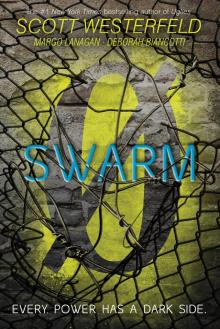 Swarm
Swarm Pretties
Pretties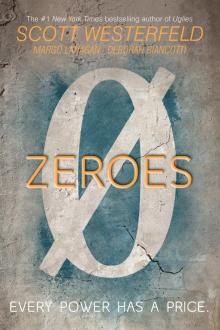 Zeroes
Zeroes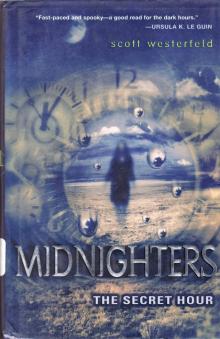 The Secret Hour
The Secret Hour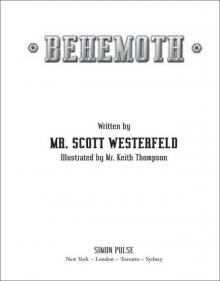 Behemoth
Behemoth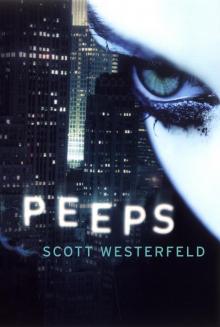 Peeps
Peeps Specials
Specials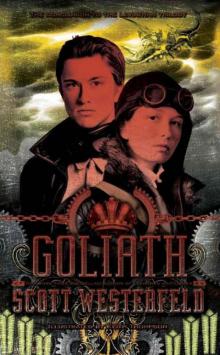 Goliath
Goliath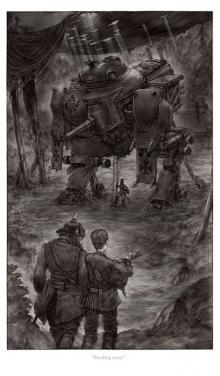 Leviathan
Leviathan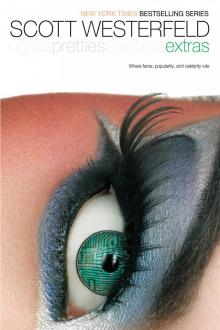 Extras
Extras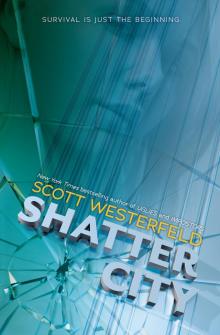 Shatter City
Shatter City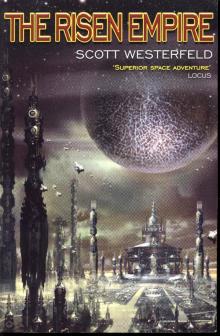 The Risen Empire
The Risen Empire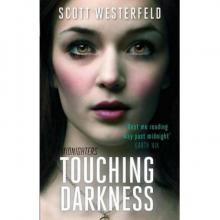 Touching Darkness
Touching Darkness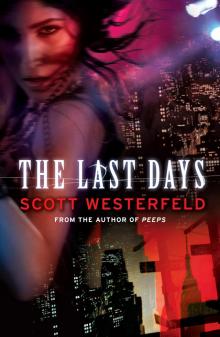 The Last Days
The Last Days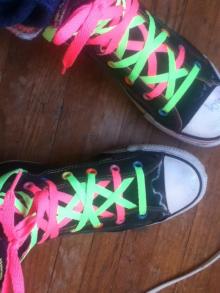 So Yesterday
So Yesterday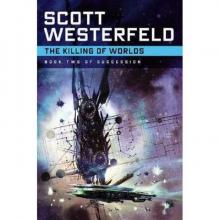 The Killing of Worlds
The Killing of Worlds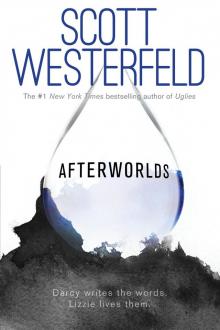 Afterworlds
Afterworlds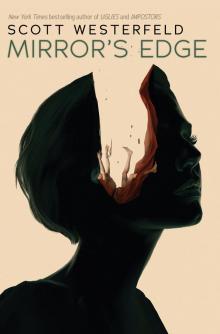 Mirror's Edge
Mirror's Edge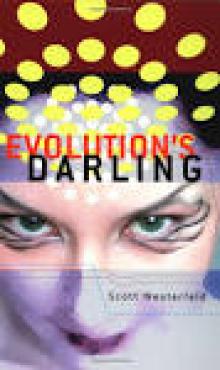 Evolution's Darling
Evolution's Darling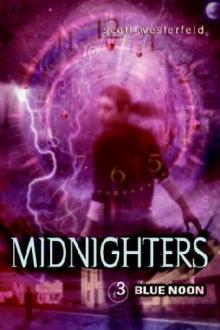 Blue Noon m-3
Blue Noon m-3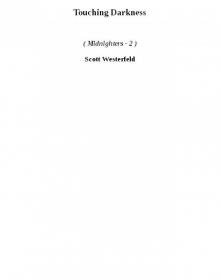 Touching Darkness m-2
Touching Darkness m-2 Impostors
Impostors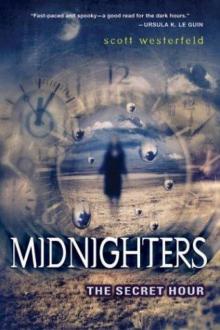 The Secret Hour m-1
The Secret Hour m-1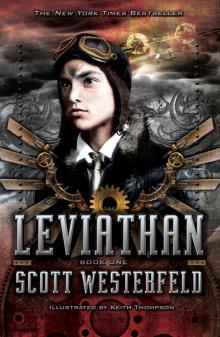 Leviathan 01 - Leviathan
Leviathan 01 - Leviathan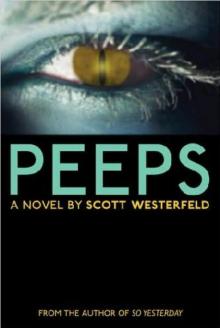 Peeps p-1
Peeps p-1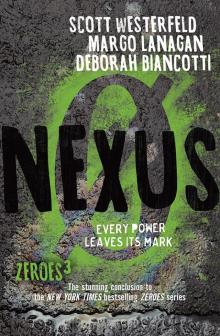 Nexus
Nexus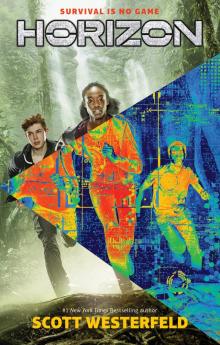 Horizon
Horizon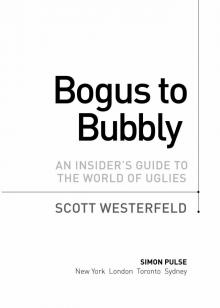 Bogus to Bubbly
Bogus to Bubbly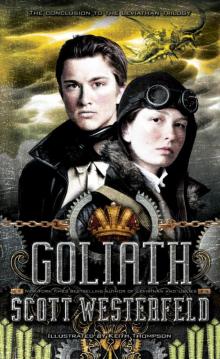 Goliath l-3
Goliath l-3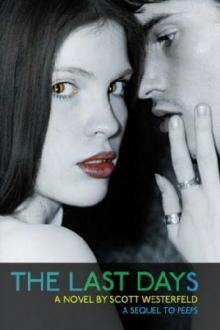 The Last Days p-2
The Last Days p-2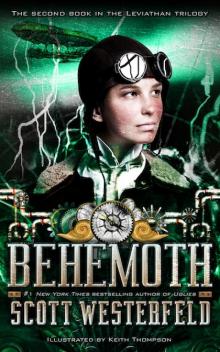 Behemoth l-2
Behemoth l-2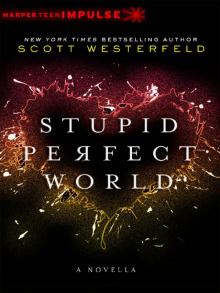 Stupid Perfect World
Stupid Perfect World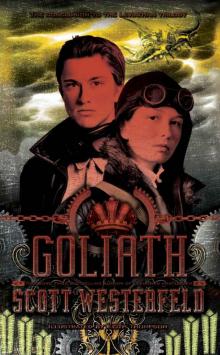 Goliath (Leviathan Trilogy)
Goliath (Leviathan Trilogy)